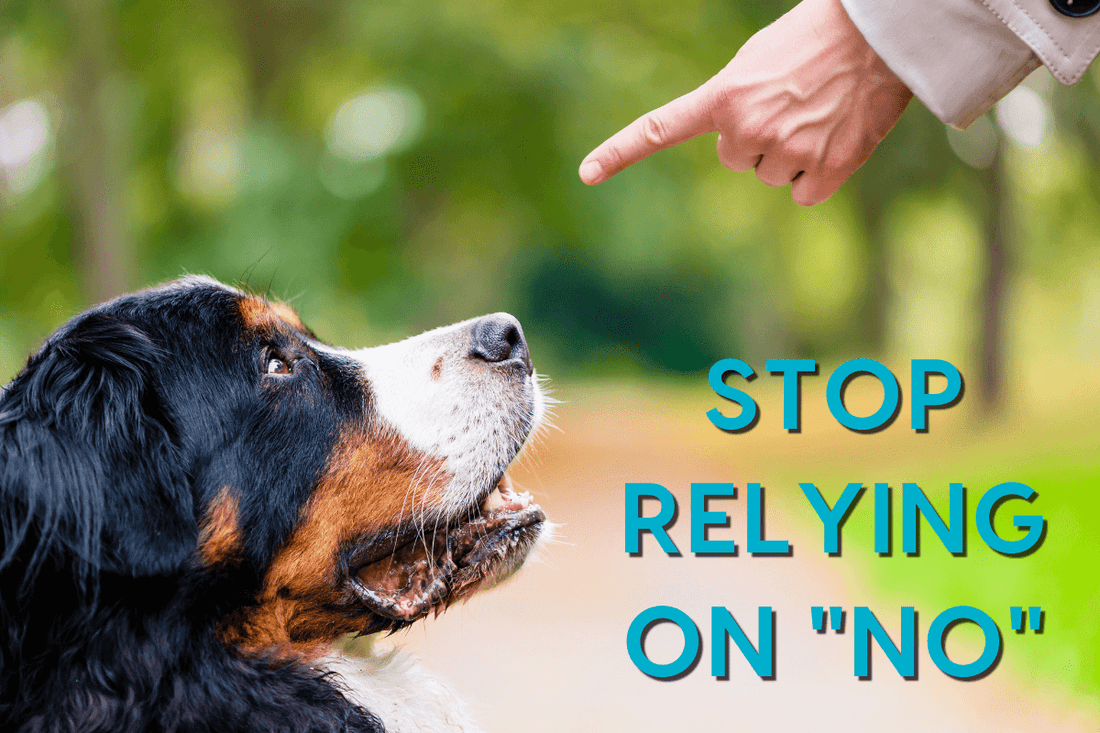Are you obsessed with the word "no" when it comes to training your dog? While the word 'no' can have a time and place in training, it isn't a 'behavior'.
Too often as pup parents, we become obsessed and oftentimes overreliant on the word 'no'. The problem with the word 'no' is that it doesn't teach our dogs what we DO want them to do!
Related Reading: How to Stop a Dog From Barking at Night
LISTEN TO PODCAST
Want to hear more podcasts like this? Please click here.
WATCH VIDEO
Want to see more videos like this? Please click here.
OVERVIEW OF STOP RELYING ON "NO"
The key to training is communication, and if the only thing we communicate to our dog is 'no' or 'stop', we've only done half the work.
If your sports coach stopped practice and just yelled 'no, no, no' with zero explanation, would your team know what to do to improve?
No, you need your coach to tell you what went wrong and what they want you to do instead. And the same goes for our pups!
We have to change our communication from 'no, no, no' to 'do this' or 'try that'.
So if you're overwhelmed by your dog barking at the door, teach them what you want them to do when someone comes to the door... instead of just saying no.
If your dog jumps on people while on walks, teach them that you want them to sit and stay when they're being greeted... instead of just saying no.
Related Reading: Train Your Dog to Greet Guests Politely
If your dog pulls on the leash, teach them where you want them to be and reward heavily when they do that... instead of just saying no.
SMART X50
Kathy Sdao coined the phrase and technique called SMART x50.
SMART stands for See, Mark, And, Reward, Training.
This technique can help you overcome your reliance on 'no' and start to focus on the good things your dog is doing. Here is what you do!
Grab a bowl and put 50 treats (Pupford ones work great!) in the bowl out of your dog's reach.
Throughout the day, look for 50 opportunities to find good behaviors your dog is doing. This shouldn't be during 'dedicated' training sessions, but rather just moments when your dog is doing something good.
Here is an example.
See- Your dog comes and lies down by your feet without being asked
Mark- Use your marker word or clicker to let your dog know that behavior is desirable
Reward- Give your dog one of the 50 treats from the bowl
Then repeat that 50 different times throughout the day!
Related Reading: How to Use a Dog Clicker
This act of focusing on the good can not only help reinforce good behaviors (which will make those behaviors happen more frequently), but it will also help you avoid using the word 'no' too frequently.
RECAP
It's not feasible to never use the word 'no' with your dog, but you shouldn't become too reliant on it.
Focus on teaching your dog what you DO want them to do! And of course, try out the SMART x50 method for at least a few days and see what it does for your communication and relationship with your pup!
Related Reading: How to Talk to Your Dog + 3 Reasons You Should









